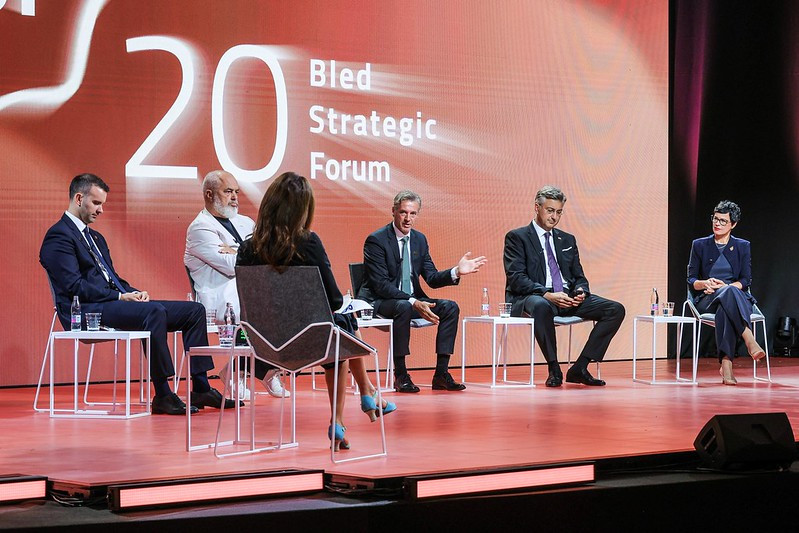Prime Minister Golob: It is important to let those who have earned it advance
Prime Minister Golob participated in the main panel of leaders, which this year focused on the issue of European Union enlargement, alongside Croatian Prime Minister Andrej Plenković, Montenegrin Prime Minister Milojko Spajić, Albanian Prime Minister Edi Rama and European Commissioner for Enlargement Marta Kos.
Prime Minister Golob said that it is important for candidate countries to be as proactive as possible in the enlargement of the European Union, while the European Commission must also take multiple proactive steps. He added that the European Union should also adopt certain changes as soon as possible.
The Prime Minister went on to say that EU enlargement may appear simple at first glance, but beyond political decisions, it is a meritocratic technical process and there are no shortcuts. He also expressed his confidence in the work of European Commissioner for Enlargement Marta Kos. "I think the enlargement process is in very good hands," said the Prime Minister.
Prime Minister Golob added that one good thing has come out of the unfortunate circumstances: following Russia's aggression against Ukraine, Ukraine – despite being at war – is implementing institutional changes very quickly. "This leaves no excuse for the European Commission when Ukraine demands an acceleration of the accession process. And it will be really difficult to say 'no' to people at war if and when they really meet all the conditions. This is a window of opportunity for the Western Balkans. We already talked about this two years ago when we said that the window had opened. So now is more or less a case of 'now or never'," said the Prime Minister, adding that the window may close again in five years' time.
The Prime Minister also noted changes in the approach to EU enlargement: "In the past, enlargement was always seen as a collective process for the entire Western Balkans, since large countries should never be left behind. That was the old story. I believe large countries will follow only when they see smaller countries succeeding,” he said, adding that it is important to let those who have earned it advance.
Earlier in the day in Bled, Prime Minister Golob held a bilateral meeting with Egypt’s Foreign Minister Badr Abdelatty. They discussed the situation in the Middle East and Minister Abdelatty thanked Slovenia for its principled stance on Palestine. They also explored ways to strengthen economic cooperation between the two countries.
The situation in the Middle East and Gaza was also the main topic of discussion with UNRWA Commissioner-General Philippe Lazzarini, with whom the Prime Minister addressed primarily the dire humanitarian situation in Gaza and the West Bank and the increasingly serious challenges facing UNRWA.
The Prime Minister also discussed this topic with Jordanian Foreign Minister Ayman Safadi, thanking Jordan for all its efforts to bring stability to the Middle East region, especially Gaza and the West Bank and expressing satisfaction over King Abdullah II’s planned participation as an honorary guest at the October MED9 Summit hosted by Slovenia.
Prime Minister Golob also met with NATO Deputy Secretary-General Radmila Šekerinska. In their talks, they expressed support for Ukraine’s defence and welcomed efforts toward achieving lasting peace. Golob reiterated that Slovenia will continue to strengthen national resilience and meet its confirmed defence capability goals in accordance with the Resolution approved by the National Assembly.
During a working lunch, the Prime Minister hosted members of the European Commission attending the forum: High Representative for Foreign Affairs and Security Policy Kaja Kallas, Commissioner for Enlargement Marta Kos, Commissioner for Equality, Preparedness, and Crisis Management Hadja Lahbib, and Commissioner for International Partnerships Jozef Síkela. The discussion focused on current foreign policy issues, particularly the situation in Gaza. Golob reaffirmed Slovenia’s clear stance that the European Union, as its most important trading partner, must increase pressure on the Israeli government, which is the only party that can stop the bloodshed in Gaza.
At the conclusion of the day, the Prime Minister also met with WTO Director-General Ngozi Okonjo-Iweala, discussing current foreign trade challenges with a focus on trade negotiations with the United States.


